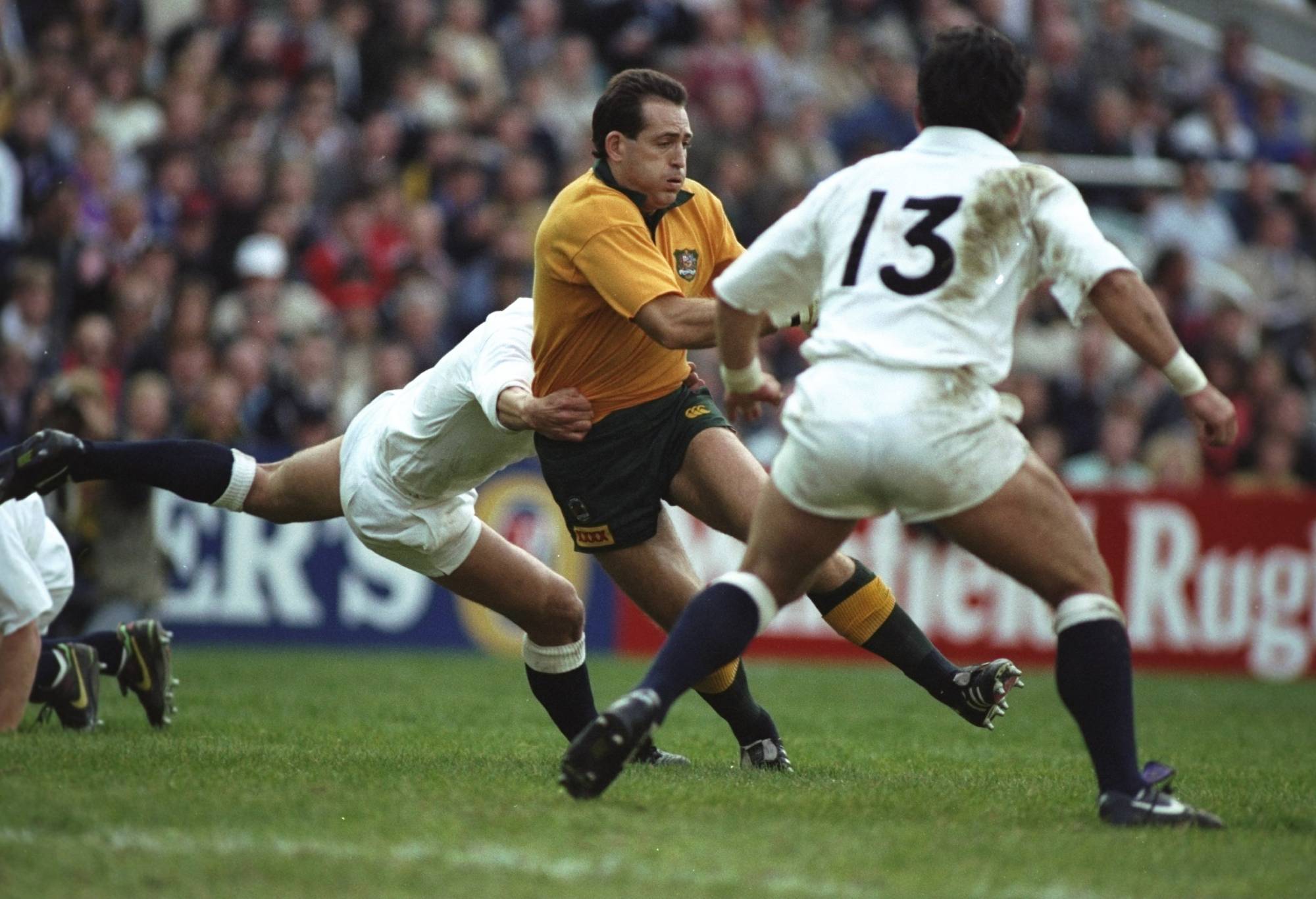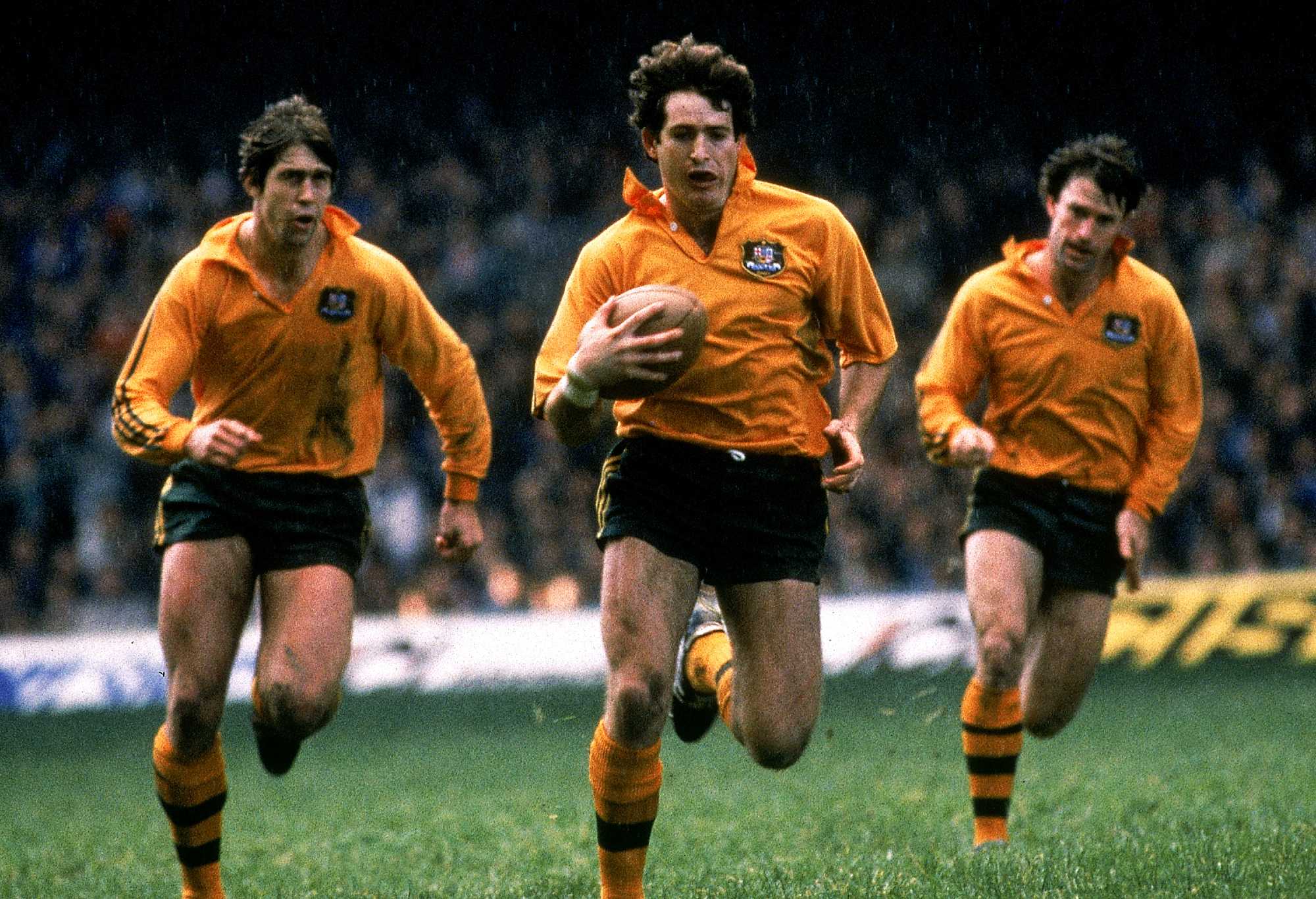David Campese is one of the greatest rugby players this country has ever produced – and also one of its biggest sooks.
That chip on his shoulder that he’s long carried when it’s come to his treatment by his home country, has become a malignant tumour.
His latest bout of “poor me” ramblings has been printed in the UK Telegraph – an interview that likely started as a walk down memory lane to that fabulous and historic grand slam tour of 1984 and ended as another step into the Aussie bashing house of horrors that is Campese’s mind.
Since his playing days Campo hasn’t just burnt bridges – he’s stacked a ton of dynamite under them and lit the fuse.
Before we get deeper into his latest complaints – a personal anecdote.
In 2019, Campese wanted to replace Daryl Gibson as Waratahs coach.
After he was rejected he contacted Athletes Voice, where I was editor, and I spent hours with him ghost writing a column about the state of coaching in Australia, and the pain of his rejection.
In the first-person column Campo asked: “Why can’t I get a job in Australia? I’ve done coaching in South Africa, Singapore, Kenya and Tonga. But in my own country I always get overlooked and I’m not sure why that is.”
So, column written and copy cleared we were set for a 7am publish the next day. That night, ahead of our publication time, Campese produced the column on his Facebook page, and almost simultaneously all of my ghost-written quotes appeared verbatim in the Sydney Morning Herald, giving them the “scoop”.
One bridge nuked. And context for this piece duly provided.
In his latest whine, Campese complains that in Australia “I’ve been cancelled, so the only way I can get my message across is through my own podcast.
“There’s not one journalist in Australia who speaks to me. I was kicked off Stan [owned by Nine, the publisher of this masthead] and out the paper, so that’s why I do my podcasts. It’s because I tell the truth.”
I would suggest there’s not one journalist in Australia who can afford to speak to Campese, budgets and expectations being what they are. There’s nothing wrong with trying to make a living but to suggest that there’s a conspiracy against him in the Australian media based on fear of the truth is out there, even for him.
In reality, Campese has always seemed to struggle with going from a global superstar as a player to mediocre media talent or unwanted coach in the years after.

Photo: Russell Cheyne/Allsport
He appears genuinely surprised and miffed that his glorious story is not celebrated as he feels it should be. Yet when The Roar put together its Greatest XV ahead of last year’s World Cup, Campo declined an interview.
He banned us at the tournament when we picked up his quotes in a paid column elsewhere and then ran them on site.
Twenty-four hours earlier, he spent 30 minutes speaking to The Roar’s Christy Doran, but when the penny dropped that he’d already signed up for an ‘exclusive’ paid column, he asked for his quotes not to be used.
In our 2019 Athletes Voice piece, Campo complained that the kids he coached didn’t recognise him. This lack of generational respect is a recurring theme – and also a weird one to be hung up about.
“When I go and coach, most of the kids have no idea who I am,” said Campo in his Athletes Voice column.
“Matt Burke was doing a coaching clinic not long ago and one of the kids said to another kid as they were walking to get a drink, ‘this is fantastic!’ The other kid said, ‘yeah, but why is that guy who reads the Channel 10 news coaching us?’
“That’s bloody scary. In Australia, we have so much rugby history yet no one knows who we are. It’s not an ego thing. You have to have a sense of history because that’s why most of us became Wallabies and won World Cups, because of the ones who played before us.”
Except it really does seem to be “an ego thing”.
The ego was bubbling up like a blocked toilet in his latest blast. A guy complaining about a lack of love, wildly throwing punches at his kin.
“In 1984, we were so proud. I’m not saying the current Wallabies aren’t but it’s a different mindset, mate. It’s about money. They’re paid. It’s a job. That’s part of life – that’s good. But when you get paid and you play for a big country I think you should have more respect and understanding of why you’re there.
“They’re playing for a team that won a grand slam and two World Cups – and they have no idea why they’re playing! When I started, aged 19, I had no idea what the hell I was doing, but I soon learnt about the history and the culture of the Wallabies.
“If you mentioned Greg Cornelsen to these guys, no one would know him. He’s the only Wallaby to have scored four tries against New Zealand at Eden Park, in 1978. No one’s got any idea! It’s about money. They’re getting 60k or whatever to play for the Wallabies – we got £20 a day. We played 18 games on the ’84 tour!”

David Campese of the Wallabies in action during a Rugby Union test match between Wales and the Australian Wallabies at the Millennium Stadium in Cardiff, Wales. Australia won 28-9. (Photo by Getty Images)
The anger kept coming. One of his pet hates is foreign coaches invading the Australian game and taking the jobs that could be done by … him.
“Joe Schmidt. He has no idea about Australian rugby. He’s a New Zealander. He’s not interested in finding out who we are. We used to counter-attack or, at least, attack from the opposition 22. Now, we maul from the 22. That’s not Australian rugby. We used to attack! In Australia, we need to entertain to get people to watch.
“I’m not saying he’s a bad coach, but why do we have to have a New Zealand coach? We’re not New Zealanders. No one has ever coached a foreign team to a Rugby World Cup victory. Eddie Jones was an assistant coach with South Africa in 2007 but look around the world now and most sides have native coaches.
“Mike Catt is coming up to coach the Waratahs. He has no idea about Australian rugby, either, he’s South African-English! Every country used to have its own unique way of playing. It’s just sad that we have to get people from other codes to coach us. That used to be what was unique about rugby; you had your own way of playing.”
And then there’s his view on the leaders of the game in Australia.
“If we didn’t have the Lions or the World Cup in 2027 then there’d be no rugby union in Australia at all,” Campese says. “We’re in so much debt, but the board is still there. What do they say, a fish rots from the head? I could pick 10 people to replace them who would do a far better job.”
No prizes for guessing who’d be No.1 on his list.
